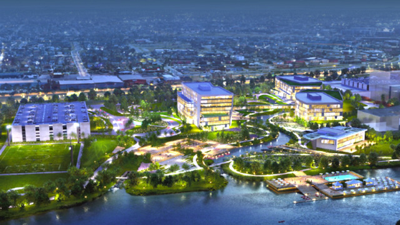
The Metro Council on Tuesday unanimously approved the economic impact plan for the planned Oracle tech campus and surrounding River North infrastructure, including an extension of Cleveland Street that will allow vehicular, bike and pedestrian connectivity between River North and East Nashville.
Projected to cost $1.2 billion, the Oracle development and public infrastructure could bring up to 1.2 million square feet of office space to the Cumberland River’s east bank. For that, the Silicon Valley corporation has committed to a $175 million investment recreational spaces, streets, stormwater management and a bike and pedestrian bridge connecting River North to Germantown.
“Today’s Oracle vote demonstrates Metro’s commitment to make the right deals for Nashville,” Mayor John Cooper said when the 40-0 resolution vote passed.
Leading up to the vote, Cooper's administration had already championed the Oracle deal — building further east bank development strategies around it by contracting New York-based Perkins Eastman to revamp the entire district as well as leading a tour of the Oracle site last week.
“This is the largest private investment and the largest job-creation deal in our history — all with no expense in our budget and no new debt,” Cooper said. “Oracle’s $1.2 billion investment will create thousands of quality jobs and help our kids succeed in the digital economy. After a challenging year, this helps kick off Nashville’s next decade of prosperity.”
The council first passed an amendment to the plan, as proposed by Councilmember Zulfat Suara, that makes it possible to allocate as much as 50 percent of tax revenues toward affordable housing efforts after Nashville has reimbursed Oracle for the $175 million spent on public infrastructure updates to the property and surrounding area.
This addresses concerns voiced by citizen organizations and government officials alike about the potential for gentrification as a result of the Oracle tech campus. Some members of the Metro Industrial Development Board have claimed the Austin-based corporation’s investment in River North will be a long-term threat to the historically Black Haynes-Trinity community.
Councilmember Sean Parker, in whose District 5 the property sits, speculated that by the time full reimbursement is realized, “You might be able to count the number on one hand those of us that are still with this body in 2028, however that shakes out. But I do think it’s really important to […] connect this economic development proposal to the impact that it’s going to have on housing in the area.”
Parker encouraged colleagues to support the Suara amendment.
The amendment, however, does not dedicate funds to affordable housing; rather, it declares the intent to do so when the time comes that financing is available to divert from reimbursement, which Councilmembers Colby Sledge and Tom Cash explained would likely be at least two terms from now.
According to Mike Jameson, the mayor's office director of legislative affairs, without Oracle’s locally unprecedented agreement to advance the infrastructure costs, Nashville would have been responsible. That likely would have led to it issuing $175 million in bonds and thereby adding another $50 million to the overall cost. He emphasized not only the savings of the tax increment financing method to be deployed but also that no risk exists for costs to land on Nashville if Oracle spends $175 million before finishing the project.
“There is no obligation whatsoever on the part of Metro to allow more than $175 million” to be reimbursed this way, said Jameson. “We understand that Metro has all the leverage should Oracle ... hit some unforeseen complication and they quickly begin exhausting their reimbursable money but they’re not quite done.”
The Cleveland Street extension was also unanimously approved as a separate resolution to establish an agreement between Metro and the Tennessee Department of Transportation to develop two underpass connections from the McFerrin Park and Cleveland Park neighborhoods, both in District 5. This extends Cleveland Street from its current dead end near its intersection with Dickerson Pike due west under Interstate 24 to merge with Cowan Street along the Oracle site until splitting back east under I-24 again to merge with Grace Street.
TDOT advised a specific federal, fund-matching option that allows Metro to pay only 20 percent of the requisite cost — with the other 80 percent coming from federal funds. With this model, Nashville will spend $1.3 million instead of $6.5 million. This also leaves $6.2 million of the original $20 million of funds appropriated in 2019 for River North capital spending available.
This approach addresses the Cooper administration’s vision to revamp the East Bank’s 338 acres according to Perkins Eastman’s urban waterfront placemaking design in collaboration with local contractors including Pillars Development, WSP, Hodgson Douglas and Varallo Public Relations. It also fulfills Cooper’s statements in an interview last fall that Nashville needed to redevelop the East Bank despite apprehension about infrastructure expenditure for Cumberland River-adjacent projects opposite Germantown and downtown.





